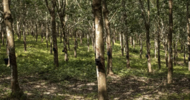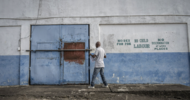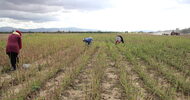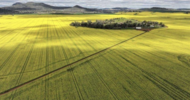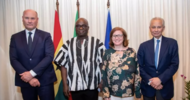FRAMING DOCUMENT
Statement: Mahendra Shah, 25th April 2010, USA/JAPAN/African Union Roundtable
The world food security goal of more than doubling production by 2050 will be challenging in an emerging environment of climate change, degrading arable land, increasing water scarcity, reduced Government and ODA investments in agriculture and the slow progress in research essential for the next green revolution. These concerns and future prospects of supply-demand imbalances and disruptions in world food markets has triggered major food importing countries and the private business sector to invest and secure foreign land resources, particularly in developing countries with untapped agricultural potential.
The developing countries are already home to the world’s one billion people suffering chronic hunger. All countries have a legal obligation to comply with the Universal Human Right to Food and this principle needs to be evoked in ensuring that foreign agricultural investments do not result in the food insecurity of the wealthy countries being transferred to developing countries, especially countries that are food insecure and lack the means to invest in their own agricultural development.
For responsible agricultural investment agreements the most critical requirement is that of access by both recipients and investors to comprehensive and reliable information to ensure environmental, social and economic sustainability. Also access to the due process of mediation and law in a situation where conflicts arise is important. In this context an international code of conduct could provide guidance and furthermore, given the criticality of world food security, a multilateral regional mechanisms to monitor and evaluate the transparency and outcomes of investment ventures should also be considered.
The key obstacle to more transparent debate and informed decisions by governments and investors is the lack of science-based information, for example the agro-ecological suitability and sustainable production potential of any given locality for different types of crops. At a national level, this information can be crucial. Parametric assumptions about yield and input levels, and application of a vector of output and input prices adjusted for transport cost spread over an appropriate time period, would allow the computation of expected investment returns and land rents from any given use. This would allow host governments to assess their comparative advantages better in negotiations with outside investors. Globally, such information can help investors who are interested in certain types of crop to identify the most appropriate countries and macro-regions to consider. There is also a pressing need to develop capacity building programmes for analysis and evaluation of agricultural investments deals as well enhancing negotiations skills in developing countries.
The IIASA – FAO integrated agro-ecological and socio-economic methodology and global database for analysis of policy options for food security and sustainable agricultural development, has recently been applied in collaboration with the World Bank to provide insight and decision support for recipients and investors.
The initial results of this study highlight that, for example, an equitable shared-benefits agreement can best provide the basis for responsible and sustainable agricultural development, especially in currently cultivated land areas where the yield gaps are large. Consider a situation whereby food production of 100 tons on a piece of land is boosted to 500 tons with foreign investments enabling adoption of high agricultural technology and management. This could be shared 200 tons for the investor and for the recipient and balance of 100 tons sold on the local market with the proceeds invested to improve infrastructure and social services for the local community. The results also indicate substantial food production potential in unprotected grassland and woodland areas. However any development in these areas will need to take account of traditional land use rights as well as risk of biodiversity loss.
Such an innovative partnership arrangement could be further structured as an official development aid (ODA). Another option is a state-sponsored and funded private-sector entity that brings modern management and best practices for a public good food security goal as well as profitable enterprise. Here the Government and ODA should provide oversight and monitoring to ensure that the long-term investment responsibility and sustainability are assured. In the midst of the 2008 world food crisis, Qatar was among the first to set up a country lead food security programme. Qatar imports over 90 percent of its food requirements and faces challenges of developing dry land agriculture in an environment of severe water scarcity. An integrated Master Plan for food security and agriculture is being developed including, for example, solar desalinization, drip irrigation agriculture and protected hydroponics, efficient food marketing and strategic storage systems as well renewable energy and a knowledge economy.
Whilst foreign investments can contribute to achieving world food security, at the same time all countries should also put in place investments and policy regimes to enhance their domestic food production. The Middle East is the world’s most food deficient region.
In March 2011, Qatar is organizing a summit – Partnering for Food Security in the Arab World and we welcome you all to join us in Doha.
Dr Shah is Director of Programme, Qatar National Food Security Programme






